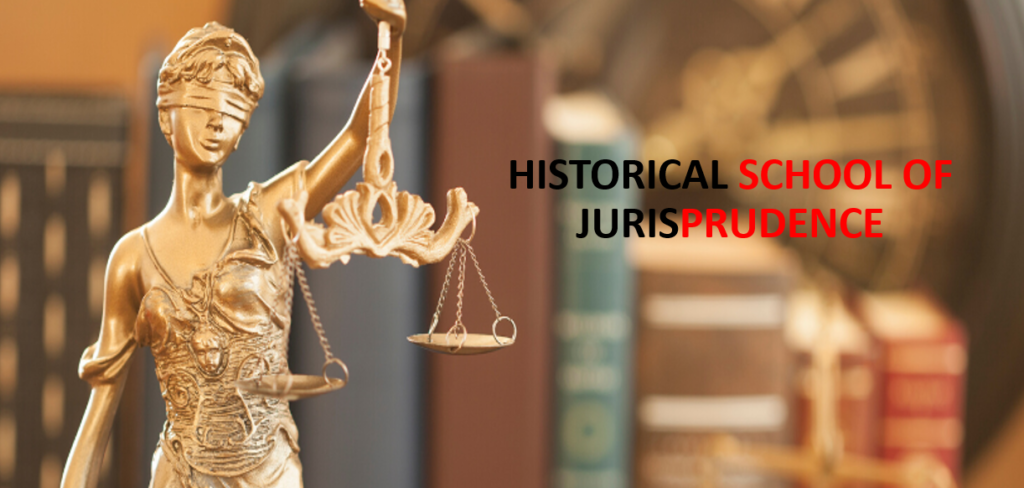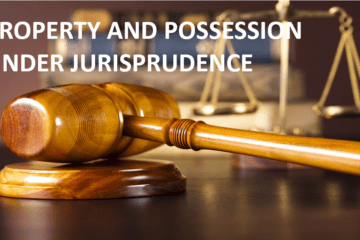
HISTORICAL SCHOOL OF JURISPRUDENCE
It may be defined as history of fundamental principles of a legal system. Historical school of Jurisprudence argued that the law is the exaggerative form of social custom, economic needs, conventions religious principles, and relations of the people with society. The historical school follows the concept of man-made laws. ‘Law is formulated for the people and by the people’ means that the law should be according to the changing needs of the people. And everyone understand their own need better than anyone else.
The followers of this school argued that law is found not made. The historical school doesn’t believe and support the idea of the natural school of law which believe that the origin of law is from superior authority and have some divine relevance.
Reasons for the Origin of Historical School of Jurisprudence
The Historical School believe that law is made from people according to their changing needs. Habits and customs are the main sources of the Historical School of Jurisprudence. According to Dias, Historical school arose as a reaction against the natural law theories.
- The reasons for the emergence of this school are:
- It’s a reaction against the natural law theories.: Natural school of law believes that the law is originated from some divine power. Natural law is also called the Eternal law. It exists since the beginning of the world. It is closely associated with the morality and intention of God. Indian constitution has some relevance of the natural law in its articles. Historical school of Jurisprudence focuses on the formation of law by people not by some divine origin.
- It opposes the ideology of the analytical school of jurisprudence. : Analytical school of jurisprudence is also called Austinian School. It is established by John Austin. The subject matter of Analytical school of Jurisprudence is positive law. It focuses on the origin of law the judges, state and legislators. Historical School laid emphasis on the formation of law by people through customs and habits, not by the judges and superior authority.
- Rationalism in Europe: the spread of the spirit of rationalism in European people was the reason for the emergence of this school. This school emphasis on the development of law, take into account the historical facts.
The S.C of India, in Byram Pestonji Gariwala v. Union of India, agreed with this viewpoint, quoting Justice Thommen: “The Indian legal system is a historical product. It is embedded in our land, nurtured and nourished by our culture, languages, and customs, cultivated and sharpened by our genius and pursuit of social justice, and reinforced by history and culture.”
Montesquieu
According to Sir Henry Maine, the 1st Jurist to adopt the historical method of understanding the legal institution was Montesquieu. He laid the foundation of the historical school in France. According to him, it is irrelevant to discuss whether the law is good or bad because the law depends on social, political and environmental conditions prevailing in society. Montesquieu concluded that the “law is the creation of the climate, local situation, accident or imposture”. He was of the view that law must change according to changing needs of the society. He did not establish any theory or philosophy of the relation between the law and society. He suggested that the law should answer the needs of the place and should change according to time, place and needs of the people.
One of the best-known works of Montesquieu was his book ‘The Spirit of laws’. In this book, he represents his beliefs in political Enlightenment ideas and suggests how the laws are required to modify according to the needs of people and society.
Savigny (1779-1861)
Savigny is regarded as a father of the Historical school. He was a German Philosopher, in 1810 he went to work as a professor at the University of Berlin. In 1803 he established his reputation with a book The Jus Possessionis of the Civil Law.
The Law has source within the general consciousness of the people. He said that Law develops like language and Law features a national character. Law, language, customs and government haven’t any separate existence. There’s one force and power in people and it underlies all the institutions. The law, language, develops with the lifetime of people.
- Savigny’s theory is often summarized as follows:
- Law is found and not made.
- According to him, law is Volkesgeist.
Volkesgeist = Volkes + Geist i.e.
(People Consciousness) = (People )+ (Consciousness)
Therefore, people Consciousness is Law
- That may be a matter of unconscious and organic growth. No efforts are needed to make the law.
- Law cannot be of universal validity nor be constructed on the basis of certain rational principles or eternal principles. Savigny argued that law is like the language having its own national character. So, it can’t be universally applied and varies according to the people.
Basic Concept of Savigny’s Volksgeist
Volksgeist means “national character”. According to Savignty’s Volksgesit, the law is the product of general consciousness of the people or will. The concept of Volksgeist was served as a warning against the hasty legislation and introduce the revolutionary abstract ideas on the legal system. Unless they support the general will of the people.
Basically, Savigny was of the view that law should not be found from deliberate legislation but should be made and arises out of the general consciousness of the people.
Criticism of Savigny’s theory
- Inconsistency within the theory: He emphasized the national character of law, but at the equivalent time he recommended a way how the Roman law are often adapted.
- Customs not always supported on popular consciousness: Savigny’s view is whole not perfectly sound, because many customs originated just for the convenience of a powerful minority. Sometimes, customs completely against one another exist within the different parts of the country which can’t be reflecting the spirit of the whole community.
- He ignored other factors that influence law: Another criticism against him was ‘so occupied with the source of law that nearly forgot the stream’. The creative function of the judge was also ignored by the Savigny’s theory.
- Many things were unexplained: Certain traits, like mode of evolution and development weren’t explained by the Savigny.
Georg Friedrich Puchta (1798-1846)
Puchta, a German jurist, was Savigny’s most popular student. He was convinced that the law was the result of people’s collective consciousness and the manifestation of their spirits. Law will not evolve in this way, according to Puchta, if it is formed without prior considerations of the past, historic culture, and traditional practices. This would have established a clear situation rather than solving an issue.
Puchta’s ideas were acknowledged as more reasonable and enhanced after a period of progress. He began by stating that men have always lived in oneness since the dawn of time. This unity could be physical as well as spiritual, focused on people’s collective will.
Self-interest, according to Puchta, caused conflicts. For the sake of maintaining peace and actual evolution law, he argued that general will should take precedence over individual will.
Furthermore, the state’s position was discussed, which is extremely important. The state prioritized the general will and interest of the people while downplaying individual interests, resulting in a functional system.
“Neither the people nor the state alone can make and formulate laws,” was Puchta’s main thought.
Puchta’s Contribution
He discussed two dimensions of human will, as well as the origins of the state.
Even though Georg Friedrich Puchta was Savigny’s student, Puchta improved Savigny’s views and gave them a better logical interpretation.
Sir Henry Maine (1822-1888)
Sir Henry Maine was the founder of the English Historical School of Law. Savigny’s views of Historical school was carried forward in England by Sir Henry Maine.
Major Works by Sir Henry Maine
- The first work of Maine ‘Ancient Law’ was published in 1861.
- He also wrote Village Communities (1871),
- Early History of Institutions (1875)
- Dissertations of Early Law and Custom (1883).
Maine studied the Indian legal system deeply as he was law member in the Council of the Governor–General of India b/w 1861 to 1869. Maine’s ideas were incorporated by the best things in the theories of Savigny and Montesquieu and he avoided what was abstract and unreal Romanticism.
Maine favored legislation and codification of law, unlike Savigny.
Maine describes the development of law in four stages:
- Therris stage
Rulers are believed to be acting under divine inspiration. And the laws are made on the commands of the rulers. For example, Themistes of ancient Greek. The judgment of the king was considered to be the judgment of god or some divine body. King was merely an executor of judgments of God, not the law-maker.
- Custom
Then the commands of King converted into customary law. The custom prevails in the ruler or majority class. Customs seems to have succeeded to the right and authorities of the king.
- Aristocracy stage
The knowledge & administration of customs goes into the hands of a minority, Due to the weakening of the lawmaking power of the original law-makers like Priests the knowledge of customs goes into the hands of a minority class or ordinary class. And the ruler is superseded by a minority who obtain control over the law.
- Codification stage
In the fourth and last stage, the law is codified and promulgated.
Static and Progressive Society
- Static societies
Societies which does not progress and develop their legal structure after the fourth stage of development of law are Static society. Static societies don’t progress beyond the era of codes.
- Progressive Society
Societies which go on progressing after the fourth stage of development of law are Progressive Societies. They develop their laws with the help of these instruments:
- Legal Fiction: Legal Fiction changes the law according to the needs of the society without making any change in the letters of the law. Legal fiction harmonizes the legal order but made the law difficult to understand.
- Equity: According to Maine, “Equity is a body of rules existing by the side of the original civil law & founded on distinct principles”. Equity helps to remove rigidity and injustice.
- Legislation: The legislation is the most effective and desirable method of legal change. Laws will be enacted and became operative officially.
Legislation is made up of 2 words:
LEGISLATION = LOGIS + LATIS i.e.
( Law Making) = (Law) + (Making)
Status to Contract
Maine is known to have commented on “status” and “contract”. He said that “the movement of progressive societies has hitherto been a movement from status to contract”. In explaining this statement, Maine said that in early times an individual’s position in his social group remained fixed; it was imposed, conferred or acquired. He just stepped into it. He accepted such fate as he found it. He could do nothing about it.
Later on, however, there came a time when it was possible for an individual to determine his own destiny through the instrumentality of contract. No longer was anything imposed on him from external forces; he was now in charge: from slavery to serfdom, from status determined at birth, from master-servant relationship to employer – employee contract.
Criticism:
Maine is criticized for oversimplifying the nature and structure of early society for the following reasons: Early society does not show an invariable pattern of movement from the three-stage development of law – from personal commands and judgments of patriarchal rulers through law as custom upheld by judgments to law as code. The so-called rigidity of the law has repeatedly be challenged by contemporary anthropologists who are of the opinion that primitive peoples were adaptable and their laws flexible.
- Return to Status
Also, there were matriarchal societies just as there were patriarchal societies. Furthermore, it has been observed that status does not necessarily gravitate to contract. Rather, the opposite development has been possible. For example, social welfare legislation in advanced countries is status-based. In the U.S., “affirmative action”, a policy that is predicated on Afro-Americanism, is status-based. Also, in Canada and UK, the status of a single mother is recognized in law. Conclusion: Although Maine lived up to his historical commitment, he overlooked the dynamics that have characterized societies across ages.




0 Comments